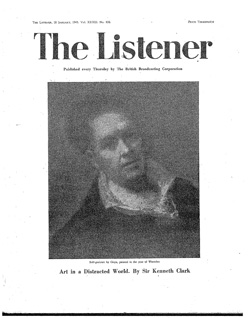In early 1945, Henry Reed wrote a set of two articles for
The Listener in which he took stock of the poetry produced during the Second World War: "Poetry in War Time." These essays are important for two reasons: first, because they offer a glimpse of Reed as an emerging critic, writing about his friends and influencers; and secondly because the criticism offered is absolutely contemporary, and written by a peer (or at least, a promising hopeful).
Many of Reed's finer poems were first published in journals before 1945, including "Sailor's Harbour," and "Chard Whitlow" (
The New Statesman and Nation), "Chrysothemis," and "Philoctetes" (
New Writing & Daylight), and "A Map of Verona" (
The Listener). Reed, however, had only published a mere handful longer pieces of criticism prior to "Poetry in War Time": "The End of an Impulse" (on Auden, Spender, and Day-Lewis) in the summer of 1943, and critiques of Edith Sitwell and T.S. Eliot in 1944.
The first of these two essays, "
Poetry in War Time: I—The Older Poets" (.pdf), appeared in
The Listener on January 18th, 1945. In it, Reed traces the influence of the French Symbolists on the great poets of his time, Eliot and Sitwell (whose work we have shown he was already intimate with, and comfortable speaking about), and their sway, in turn, on the older poets he considers most influential during the war: Edwin Muir, Louis MacNeice, and C. Day-Lewis:
The two poets of the 'thirties who have best succeeded in being also poets of the 'forties are Louis MacNeice and Cecil Day Lewis. They have always had great curiosity and initiative in exploring new musical possibilities for the lyric. Some of their earlier experiments do not wear well: the effects of MacNeice's 'The Sunlight on the Garden', for example, or some of the curious early poems of Day Lewis, where one finds the rhymes put at the four corners of a stanza like stones holding down a table-cloth at a breezy picnic. In MacNeice's Plant and Phantom and in his poems published since, flashy wantonness has all but disappeared. The final 'Cradle Song' in the volume is very haunting; and some of his later topical poems (for example 'Brother Fire') have shown an honesty and calmness of approach unusual in war-time verse.
Next, we'll continue with Part II of Reed's essays on poetry in war-time: "The Younger Poets."
Reed's freelance career with the BBC was more or less over before the demise of the Third Programme in 1970, and he would produce only a handful of translations for broadcast in the following years. Part of the problem was his reluctance, or inability, to adapt to the new medium of television. He had a
disastrous experience working with the director Ken Russell on a film about the composer Richard Strauss in 1969-70. This is widely regarded as Reed's only foray into television.
I found a surprising story today in Sean Day-Lewis's memoir of his father,
C. Day-Lewis: An English Literary Life (London: Weidenfeld and Nicolson, 1980), which proves Reed dared to delve into television at least one time, previously. In 1963, Reed had a run-in in Dorset with his friend and fellow poet Cecil Day-Lewis, when both men were working on rival Thomas Hardy projects for TV:
Earlier that summer Cecil had done his work as commentator on a short film about Thomas Hardy made by David Jones for the
bbc Television arts programme
Monitor. He had said some of his piece at the
Upper Bockhampton cottage, near Dorchester, where Hardy was born in 1840. By chance, the poet Henry Reed, the source of so many of the jokes on which Cecil dined out, was at the same time making a Hardy programme for
Southern Television. Between them they built this coincidence up into a hilarious anecdote which had the lane jammed with outside broadcasting units, a sea of crossed wires and cross technicians, and the two poets shouting infuriated insults to each other, Cecil ponitificating indoors, and Reed holding forth in the garden. Whatever the difficulties, the
bbc film was completed and broadcast at the end of November (p. 254).
Can't you hear the two men pouring derision at each other, playing it up for the cameras and crew?
"Day-Lewis, you hack! Are you going to spend all day in there?" "We'll be through when we're through, Reed! You has-been!" That's a lovely compliment about Day-Lewis retelling Reed's jokes, too.
And here's a bit of film-and-tv trivia for you: the actress
Kika Markham played Tess in the
BBC's film (click on "reveal extra detail"). I recognize her from her cameo as Sean Connery's wife in the 1981 movie,
Outland.
|
1536. L.E. Sissman, "Late Empire." Halcyon 1, no. 2 (Spring 1948), 54.
Sissman reviews William Jay Smith, Karl Shapiro, Richard Eberhart, Thomas Merton, Henry Reed, and Stephen Spender.
|








